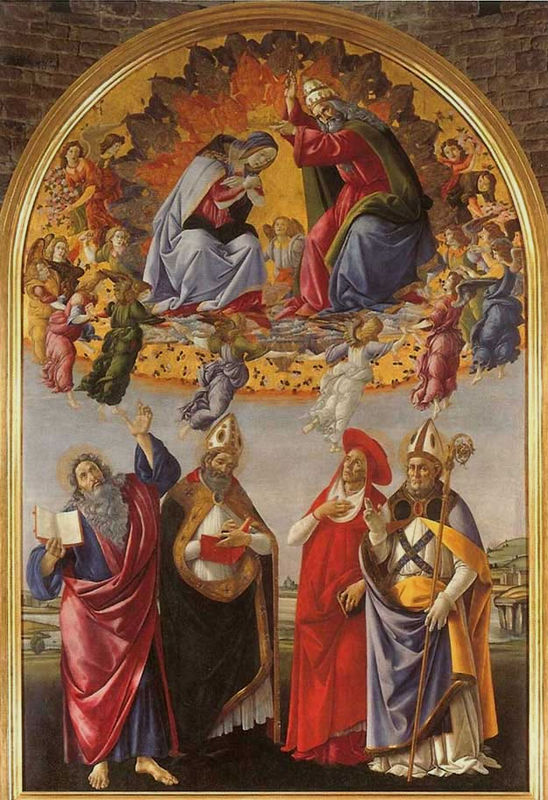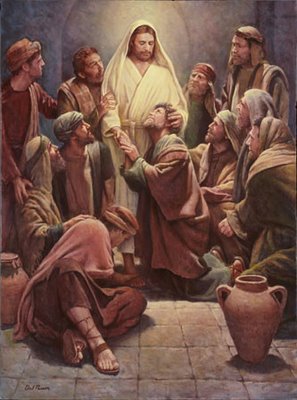compunction
This type of remorse may be found in the writings of St. John Chrysostom, St. Gregory the Great, St. Anselm, and St. John Climacus and St. Ignatius of Loyola.
Tears for sorrow for sin are called, collectively, compunction.
Come now, insignificant man, fly for a
moment from your affairs, of mankind, alas the universal lamentation
of the children of Adam! escape for a little while from the tumult of
your thoughts. Put aside He groaned with fullness; we sigh with
hunger. He was prosperous; now your weighty cares and leave your
wearisome toils. Abandon we go begging. He in his happiness had
possessions and in his misery yourself for a little to God and rest
for a little in Him. Enter into the abandoned them; we in our
unhappiness go without and miserably inner chamber of your soul, shut
out everything save God and what do we yearn and, alas, we remain
empty. Why, since it was easy for can be of help in your quest for
Him and having locked the door seek him, did he not keep for us that
which we lack so much?--- St. Anselm, Prosologion
continence or celibacy
You ought anxiously to consider again and again what sort of a burden this is which you are taking upon you of your own accord. Up to this you are free. You may still, if you choose, turn to the aims and desires of the world (licet vobis pro artitrio ad caecularia vota transire). But if you receive this order (of the subdiaconate) it will no longer be lawful to turn back from your purpose. You will be required to continue in the service of God, and with His assistance to observe chastity and to be bound for ever in the ministrations of the Altar, to serve who is to reign.--- Old Rite of Ordination
perseverance
I Have now to consider the subject of perseverance with greater care; for in the former book also I said some things on this subject when I was discussing the beginning of faith. I assert, therefore, that the perseverance by which we persevere in Christ even to the end is the gift of God; and I call that the end by which is finished that life wherein alone there is peril of falling. Therefore it is uncertain whether any one has received this gift so long as he is still alive. For if he fall before he dies, he is, of course, said not to have persevered; and most truly is it said. How, then, should he be said to have received or to have had perseverance who has not persevered? For if any one have continence, and fall away from that virtue and become incontinent,--or, in like manner, if he have righteousness, if patience, if even faith, and fall away, he is rightly said to have had these virtues and to have them no longer; for he was continent, or he was righteous, or he was patient, or he was believing, as long as he was so; but when he ceased to be so, he no longer is what he was. But how should he who has not persevered have ever been persevering, since it is only by persevering that any one shows himself persevering,--and this he has not done? But lest any one should object to this, and say, If from the time at which any one became a believer he has lived--for the sake of argument--ten years, and in the midst of them has fallen from the faith, has he not persevered for five years? I am not contending about words. If it be thought that this also should be called perseverance, as it were for so long as it lasts, assuredly he is not to be said to have had in any degree that perseverance of which we are now discoursing, by which one perseveres in Christ even to the end. And the believer of one year, or of a period as much shorter as may be conceived of, if he has lived faithfully until he died, has rather had this perseverance than the believer of many years’ standing, if a little time before his death he has fallen away from the stedfastness of his faith.--- St. Augustine
I Have now to consider the subject of perseverance with greater care; for in the former book also I said some things on this subject when I was discussing the beginning of faith. I assert, therefore, that the perseverance by which we persevere in Christ even to the end is the gift of God; and I call that the end by which is finished that life wherein alone there is peril of falling. Therefore it is uncertain whether any one has received this gift so long as he is still alive. For if he fall before he dies, he is, of course, said not to have persevered; and most truly is it said. How, then, should he be said to have received or to have had perseverance who has not persevered? For if any one have continence, and fall away from that virtue and become incontinent,--or, in like manner, if he have righteousness, if patience, if even faith, and fall away, he is rightly said to have had these virtues and to have them no longer; for he was continent, or he was righteous, or he was patient, or he was believing, as long as he was so; but when he ceased to be so, he no longer is what he was. But how should he who has not persevered have ever been persevering, since it is only by persevering that any one shows himself persevering,--and this he has not done? But lest any one should object to this, and say, If from the time at which any one became a believer he has lived--for the sake of argument--ten years, and in the midst of them has fallen from the faith, has he not persevered for five years? I am not contending about words. If it be thought that this also should be called perseverance, as it were for so long as it lasts, assuredly he is not to be said to have had in any degree that perseverance of which we are now discoursing, by which one perseveres in Christ even to the end. And the believer of one year, or of a period as much shorter as may be conceived of, if he has lived faithfully until he died, has rather had this perseverance than the believer of many years’ standing, if a little time before his death he has fallen away from the stedfastness of his faith.--- St. Augustine
studiosity-the study of the faith
Further, that which makes man like to God, and which he receives from God, cannot be an evil. Now all abundance of knowledge is from God, according to Sirach 1:1, "All wisdom is from the Lord God," and Wisdom 7:17, "He hath given me the true knowledge of things that are, to know the disposition of the whole world, and the virtues of the elements," etc. Again, by knowing the truth man is likened to God, since "all things are naked and open to His eyes" (Hebrews 4:13), and "the Lord is a God of all knowledge" (1 Samuel 2:3). Therefore however abundant knowledge of truth may be, it is not evil but good. Now the desire of good is not sinful. Therefore the vice of curiosity cannot be about the intellective knowledge of truth.--- St. Thomas Aquinas
wisdom
Where faith is a simple knowledge of the articles of Christian belief, wisdom goes on to a certain divine penetration of the truths themselves. --- John Hardon, S.J.
Further, that which makes man like to God, and which he receives from God, cannot be an evil. Now all abundance of knowledge is from God, according to Sirach 1:1, "All wisdom is from the Lord God," and Wisdom 7:17, "He hath given me the true knowledge of things that are, to know the disposition of the whole world, and the virtues of the elements," etc. Again, by knowing the truth man is likened to God, since "all things are naked and open to His eyes" (Hebrews 4:13), and "the Lord is a God of all knowledge" (1 Samuel 2:3). Therefore however abundant knowledge of truth may be, it is not evil but good. Now the desire of good is not sinful. Therefore the vice of curiosity cannot be about the intellective knowledge of truth.--- St. Thomas Aquinas
wisdom
Where faith is a simple knowledge of the articles of Christian belief, wisdom goes on to a certain divine penetration of the truths themselves. --- John Hardon, S.J.
[Wisdom] is a breath of the power of God, and a pure emanation of the glory of the Almighty; therefore nothing defiled gains entrance into her. For she is a reflection of eternal light, a spotless mirror of the working of God, and an image of his goodness. For [wisdom] is more beautiful than the sun, and excels every constellation of the stars. Compared with the light she is found to be superior, for it is succeeded by the night, but against wisdom evil does not prevail. I became enamored of her beauty.--- Catechism of the Catholic Church 2500














